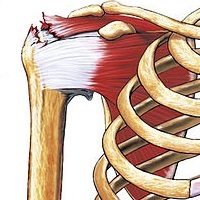
Photo from wikipedia
BACKGROUND The correlation between shoulder strength deficits and function in rotator cuff tears remains uncertain. This study aimed to determine the correlation between shoulder strength deficits and shoulder function evaluated… Click to show full abstract
BACKGROUND The correlation between shoulder strength deficits and function in rotator cuff tears remains uncertain. This study aimed to determine the correlation between shoulder strength deficits and shoulder function evaluated by various clinical scoring systems. METHODS A total of 262 patients (mean age, 59.67 years [standard deviation, 8.06 years]) who underwent full-thickness rotator cuff repair were included. Patients in group I (n = 188) had small to large rotator cuff tears, whereas those in group II (n = 74) had massive rotator cuff tears. Demographic factors, isokinetic test results, and shoulder function evaluated using various scoring systems were obtained. Correlation differences according to severity of the rotator cuff tear were evaluated. RESULTS We found weak correlations between shoulder strength deficits (peak torque and total work) and clinical outcomes in patients with rotator cuff tears (r = -0.288). For patients in group I (nonmassive tears), we found a weaker correlation (r = -0.242) according to the tear pattern. However, shoulder strength deficits in group II patients (massive tears) were strongly correlated with American Shoulder and Elbow Surgeons (r = -0.598), Constant (r = -0.582), and Short Form 36 (r = -0.511) scores, especially regarding internal rotator strength deficits. CONCLUSIONS Shoulder strength deficits measured via isokinetic testing and shoulder function were weakly correlated in patients with rotator cuff tears. However, shoulder strength deficits in patients with massive tears considerably worsened shoulder function and systemic disability, but not regional disability. In particular, internal rotator strength deficits were strongly correlated with poor shoulder function.
Journal Title: Journal of shoulder and elbow surgery
Year Published: 2019
Link to full text (if available)
Share on Social Media: Sign Up to like & get
recommendations!